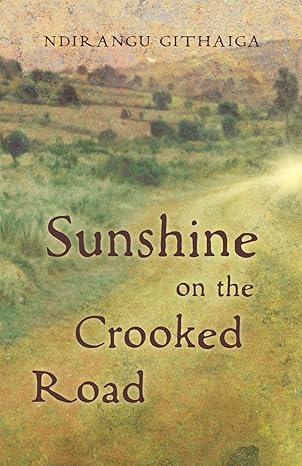Book Review: Sunshine on the Crooked Road
Reviewed by:
Eryka ParkerSunshine on the Crooked Road is a sensational novel that resonated with me. There’s even a mention of Martha’s Vineyard, where I happened to be while reading. The vivid settings and emotional undercurrents of the story anchored me to the lead character Wanjikũ’s life journey. Ndirangu Githaiga, in his fourth published novel, demonstrates a rare gift for excellent character development, thoughtful story progression, and the ability to convey political and social realities with meaningful impact. This narrative is as much about the main character’s personal arc as it is about the historical components, and its power lies in that interplay.
The story, which spans several decades, follows married couple Wanjikũ and Kabogo as they leave Kenya and then return to the country in a newly independent state after spending six years in the United States. In the US, Wanjikũ has relied heavily on her intimate friendship with Karen during a time when her marriage felt increasingly fragile. Karen’s friendship becomes an emotional lifeline. Through Karen and her husband, Bill, Wanjikũ experiences unwavering support she is unable to find in her marriage or extended family. Karen is present for her during a critical time that Kabogo neglects entirely, offering Wanjikũ the care and compassion she needs but cannot request from him.
This story captures the emotional reality of living abroad before the internet existed, when international college students’ reliance on scarce local news for updates about their country’s highlights added to the isolation they must have experienced. Feeling disconnected, vulnerable, and often uncertain about what their families were experiencing and what awaited them back home.
The story also reflects on the limitations placed on Wanjikũ’s independence by her husband; her attempts to pursue a college education or learn a trade are consistently discouraged; her ambitions constantly undermined. Even during deeply personal milestones, such as his wife’s pregnancy, Kabogo’s reaction is emotionally flat. A pivotal hospital scene reveals his calculated detachment and the degree to which appearances matter more to him than connection. Kabogo’s rash decisions often disregard Wanjikũ’s input, and he shows little interest in her pursuits or feelings, setting the tone for the life that awaits them back in Nairobi.
Cultural details also enrich the narrative and add authenticity, grounding the story in its Kenyan roots. Wanjikũ and Kabogo’s homecoming, full of the promise of a nation reinventing itself, quickly reveals the complexities of life after a prolonged absence. Wanjikũ faces estrangement from her in-laws, and she must also navigate the political turbulence of the 1970s and ’80s, and the challenges of motherhood while seeking a sense of community and self-worth. Instead of folding inward, she builds a chosen family—friends who are loyal, protective, and willing to stand beside her against challenges, including corruption and exploitation that threaten her business crafting stylish kitenge outfits. Their daughter, Nyag?thi?, grows up as a brave, inspiring, and self-aware young lady, keenly conscious of her father’s neglect and unwilling to grant him access to cause her more emotional pain.
Githaiga’s greatest strength lies in how real his characters feel. Wanjikũ is a complex and fully human protagonist—flawed with a quiet strength shaped by her reflective moments and bold actions. The novel’s cultural and political context is woven seamlessly into her personal story. Kenya’s post-independence uncertainty, the creeping reach of corruption, and evolving societal norms never overwhelm the narrative but form a subtle, persistent setting where Wanjikũ’s new life carefully unfolds.
There are, however, early moments between Wanjikũ and Kabogo where the pacing could be a bit smoother. At times, the narrative rushes from one point to another, such as the proposal, the wedding, and their move to the United States. Certain revelations, particularly about Kabogo’s true nature, could have had greater impact had more context been provided about their relationship before the nuptials. I often found myself wondering if there were any signs of Kabogo’s narcissism, neglect, and apathy in the early stages of their relationship.
Still, the novel is layered, tender, and stirring. Githaiga shows a remarkable ability to balance the intimate with the historical, showing how everyday acts of kindness and community carry as much weight as sweeping political change. The relationships, especially the friendships with beloved characters—like Mama Milka, Ugochi, and Karen—feel deeply authentic, offering comfort and stability to the characters while grounding the reader in the heart of the story.
I would recommend Sunshine on the Crooked Road to readers who love emotional, character-driven stories set against rich cultural and historical backdrops, as well as those interested in East African life and postcolonial narratives told through the lens of ordinary people banding together while navigating extraordinary times. It’s a book for anyone who values stories of fortitude, the creation of found family, and the courage it takes to reclaim one’s life.
By the time I reached the last pages, I was struck by how the crooked road of Wanjikũ’s life had led her to a place of light. Her journey is not without hardship, but it is one of understated triumph, built on people and places that made her whole again. Githaiga’s novel affirms that even when your marriage, your country, and your sense of belonging feel frayed, the act of creating—whether it’s fashion, family, or a new path forward—can always bring you back home, back to yourself.

